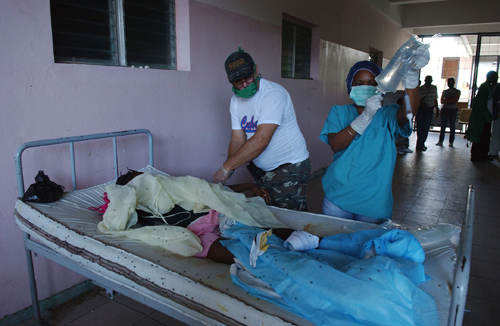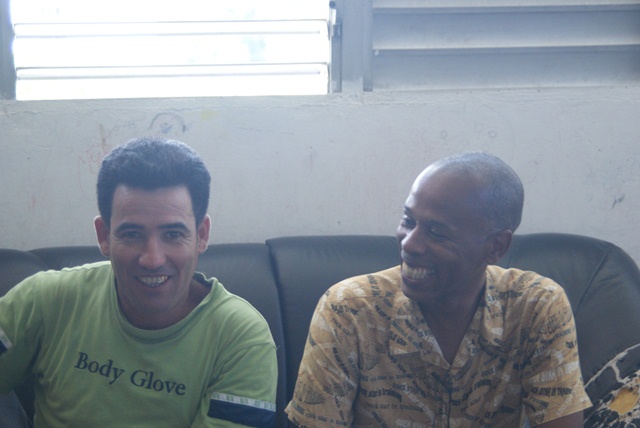This video is less than 4 minutes long.
December 3rd: Requiem for Cuban Medicine? / Miriam Celaya
The picture illustrating this post, which I downloaded from an official site, relates to one of many that exist on the intervention of Cuban doctors in Haiti after the earthquake that struck that country in 2010, and also about the cholera epidemic. Interestingly, on this December 3rd, Latin American Medicine Day, I failed to find any photograph of our doctors caring for victims of cholera in Cuba.
Of course, some might say that you cannot photograph what does not exist. Judging by the official press, and in the absence of convincing medical reports, it appears that what is circulating in Cuba -especially in the eastern region of the Island- is not cholera, but an outbreak of acute diarrhea. Another euphemistic phrase that a few months ago defined cholera in the official media was intestinal infection from water contamination, which in turn was also reported as being under control and eliminated.
Today we woke up with a phony media celebration. The TV morning news was pleased with the doctors’ day, and once again listed the countless achievements and sacrifices of health professionals, while Cubans on the Island continue to be exposed to the dangers of cholera and dengue fever, two epidemics that have already claimed many lives and remain hidden, concealed under the government triumphalist speeches and the accomplice silence of health authorities.
There is nothing to be celebrated this December 3rd. In actuality, we should be mourning the lack of freedom that keeps Calixto Ramón locked up in a government prison. He is the freelance journalist who first made mention of the presence of cholera in the province of Granma and other regions of Cuba, who has been on a hunger strike for 22 days, so far. We should be mourning the loss of human lives due to the criminal lack of responsibility of the government and healthcare officials. We should be mourning the helplessness of the people against the rampant lack of hygiene and the death of medical ethics.
What good is so much professional talent, so many hours sacrificed, working in appalling conditions, or the internationalists’ absence from country and family, if our doctors are unable to comply with the ethical obligation to disclose the risk faced by the population? When did the sacred duty of those who once swore to protect us become subordinate to the commitment of political ideology?
At present, only a few doctors dare to overcome their fear and compromise their personal and professional interests to alert patients about epidemics silenced by government policies. Most remain silent.
This December 3rd reminds us that there are very few doctors with dignity in this country, once such an example of medical care, that for so long had such a great primary care health system. So far, the silent docility of those who one day took the Hippocratic Oath constitutes a desecration to the memory of the illustrious Cuban doctor, Carlos Juan Finlay, born on this day in long ago 1833.
Translated by Norma Whiting
December 3 2012
Declaration from the Christian Liberation Movement Regarding the European Union’s Common Position / Rosa Maria Paya Acevedo #Cuba #MCL
The reasons behind the position held by the European Union (EU) concerning human rights in Cuba have not changed in the last 16 years. The Cuban Government has not recognized the fundamental rights of Cubans. With the imminent and necessary revision of the current Common Position and the possibility of future pacts with the Cuban governments, the Christian Liberation Movement (MCL) has a duty to remind the EU that the Cuban people will not have the opportunity to participate and freely interact with EU states until Cuban authorities decide to make real internal changes to promote an open society.
The cooperation of the European Union with the Cuban government, without signs of a democratization process in the island, encourages and helps sustain a system that denies freedom and opportunity to its own citizens. Oswaldo Payá denounced this nine years ago with the following words: “The denial of hope.”
Change in Cuba is unavoidable and urgent, but it has not taken place. The response of the Cuban democracy movement to the attempt of fraudulent change” that the regime seeks in order to stay in power and oppress the people can be found in “The People’s Path,” which has been signed by over 70 organizations and 1,200 leaders, activists and citizens inside and outside the island.
This document contains basic claims that members of the opposition articulate through various strategies and styles. The MCL draws attention once again to the danger that lurks, disguised as legal reforms carried out by the Government; none of the which are democratic because they do not guarantee human rights to the people.
To establish a dialogue with a single part of our society, those who silence and oppress the majority of Cubans, is to participate in the exclusions to which the Cuban oligarchy subjects the people. The MCL does not support the isolation of Cuba, nor an external embargo, but it is also important to denounce the isolation that the people are subjected to by the Regime. We understand that the interests of organizations, businesses and citizens of the European Community need to be defended, but we hope that we can fight in parallel for equal rights for Cubans.
Our civil society, which is part of the people, has flourished in a range of initiatives and trends whose primary objective is attaining respect for human rights. More than 25,000 Cubans have legally joined a plebiscite that demands fundamental rights for citizens. We continue demanding and awaiting the government’s response, in the same way that we expect the international community to demand that the Cuban authorities complies with their own laws.
More than 17,000 people inside and outside the island have expressed their concerns, proposals and dreams by joining a National Dialogue to which all were invited. The result of this fraternal dialogue is the Transitional Program, which is not set in stone, but which is a concrete platform to build on in an orderly and peaceful fashion to bring democracy to our country.
The lack of freedom of association, expression, choice and mobility blocks any real and effective participation of the people in the construction of their present and future.
Free elections should be conducted, they must include every political current in our nation. That is the message that Cubans expect the democracies of the world to send to those who are trying to perpetuate the Dictatorship in Cuba. We cannot speak of real change because we Cubans still cannot freely enter and leave the island, we cannot decide what kind of education to give our children, we do not have sovereignty of our private property, many of us are imprisoned for expressing our ideas or proposing our social and political projects; real change will come with our human rights.
The repression and aggressiveness with which the Cuban Government, through the organs of State Security, oppresses those who peacefully oppose, have intensified in recent times. This fact has been sadly demonstrated in the violent – and still unexplained – car crash, which took the life of our general coordinator Oswaldo Payá Sardinas, who was awarded the Sakharov Prize for Freedom of Thought in 2002, and one of our younger leaders, Harold Cepero Escalante. There has been a complete lack of information about what occurred.
Other examples are the many and frequent death threats that were made to Oswaldo Payá by the political police, the current intimidation of his family and the abuses that members of our movement are subjected to, as well as the constant beatings and arbitrary arrests of many other members of the Cuban democracy movement.
Those who participate and work on the Path of the People and the legal democratic initiatives that we promote, suffer constant harassment. In addition, many independent journalists, bloggers, dissidents and democracy activists across the Island are also harassed and mistreated daily.
We urge the international community, the European Union and its High Representative for Foreign Affairs and Security, Catherine Ashton, to work in solidarity with us, to be consistent and coherent with the democratic traditions of their own nations, and to demand a respectful, honest and direct dialogue to promote the interests of all Cubans.
This is only possible if the law and practice guarantee fundamental freedoms, which are not respected today. We hope the European Union will join the Cuban democracy movement in support of the demands expressed in The Path of the People, in our demand for transparency for Cuba, and in the beginning of the real changes that our people want and need.
ALL CUBANS, ALL BROTHERS AND SISTERS, AND NOW OUR FREEDOM!
Christian Liberation Movement
Havana, November 20, 2012
Loss of Values in Cuban Civil Society Officially Recognized / Anddy Sierra Alvarez #Cuba
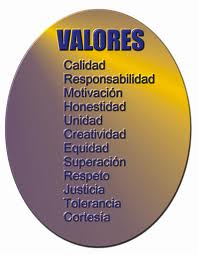 The prime time news on Cuban television provides an account of the loss of values of Cuban civil society.
The prime time news on Cuban television provides an account of the loss of values of Cuban civil society.
In it they highlight a complaint by a doctor who is bothered by the loud music at night recreation center near his house. The victim in this case, the doctor, complained for several days without getting any response.
Several people are victims of lack of education! Where do they put the churches and underground gay shows?
These two in recent years have expanded throughout the whole island. The activity with microphones or loud music or building a very musical church! They do not consider the place that is always surrounded by neighbors.
The Cuban Revolution with its more than 50 years of existence has brought many irreparable customs that in their promoters’ eyes are good.
What did the Revolution teach us?
In a bus today today, a person with a small child, be it a man or a woman, should be given a seat, but men and women both, many of them turn away to show they’re not looking, but sometimes you see someone chivalrous, but you don’t see it every day.
Formal presentations by the TV is a waste of time, the practice has always been the best way but since even that has fruit, a society destroyed by a revolution of equality where some work and others who work live. “This is what we will continue to develop.”
The Revolution taught us to organize a line of people has already failed, no one lines up to catch a bus (the word “last person” does not exist*).
Formal educational presentations on the TV are a waste of time, the practice has always been the best way but it no longer bears fruit, a society destroyed by a revolution of equality where some work and others live on their work. “This is what we will continue to develop.”
*Translator’s note: In Cuba, it’s customary for new people arriving at a line or a waiting room or area to ask “who is the last person?” and to organize themselves in that way, versus standing for long hours in line.
December 3 2012
Those Black People / Luis Felipe Rojas

Who threw the chalk? The black guy! You have the nose of a negro. But, honey, you’re not that black. Why don’t you smooth down those “curls” so you won’t look so black? Hey, mulatto, you really made those kids of yours ahead of time. Big-lipped negro. We black people are only good as musicians or boxers. Do you remember that Santisteban was the only white boxer of the national team for a long time?
Hey, lower your voice, this sounds like a house full of niggers. Man, today I’ve worked more than a slave (black, of course). Come here, what’s your name? The police approach me and says: “Look, nigger, if it weren’t for the Revolution you’d still be cutting sugar cane in San German”.
And in that neighborhood there are a lot of black people. Oh, they’re black, but they are good people. These, and thousands of other comments also cast a shadow over being Cuban. We are patriots, we fight in “a quarter of land”, but we stay quiet before such grotesque and racist expressions such as these, and more… sometimes we repeat them as if nothing happened inside. We should think about this sometime.
And, about that…who threw the chalk? That black guy.
Translated by Raul G.
2 December 2012
Programs / Regina Coyula #Cuba
Meanwhile at my unsuspecting neighbor Tomás’s house, the DVD overheats with the Pequeño Gigante program (Latin American TV can be just as bad as Cuban TV), and others are anesthetized by the Brazilian telenovela (they say today’s Cubans are worse than the worst of the Mexicans); I find my neurons peeling with the episodes of The Cold War, produced by Ted Turner. The series has me hooked with so much information to me on that era in recent history. Even my son is infected, and of course asks a ton of questions.
We Cubans continue in the inertia of that era, or if not, tell me… doesn’t the the case of Alan Gross seem like an episode that escaped from the Ted Turner series?
December 3 2012
Cuba: The Time to Fill the Jails Came Again / Ivan Garcia #Cuba
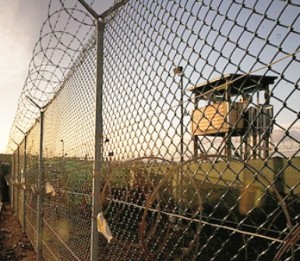 Trying to analyze the strategy of the Castro brothers is an exercise in pure abstraction. Their way of moving tokens on the political board tends to go against logic. The incarceration of 75 dissidents ordered by Fidel Castro in the spring of 2003 was a miscalculation.Foreign pressure led General Raul Castro to correct the error.
Trying to analyze the strategy of the Castro brothers is an exercise in pure abstraction. Their way of moving tokens on the political board tends to go against logic. The incarceration of 75 dissidents ordered by Fidel Castro in the spring of 2003 was a miscalculation.Foreign pressure led General Raul Castro to correct the error.
In February 2010, the death of peaceful opponent Orlando Zapata Tamayo after a prolonged hunger strike was the trigger for the government to initiate tripartite negotiations with the national church and the Spanish Foreign Minister Miguel Angel Moratinos.
Committed to tepid economic reforms, the Castro II regime needed international recognition and to attract foreign investment. The liberation and subsequent exile of almost a hundred political prisoners permitted the olive green autocracy to ease pressure, buying time and a little political oxygen.
Not much. Enough to tiptoe across the world stage and mitigate the criticism by western governments for the repeated violations of human and political rights.
Political prisoners constitute a formidable weapon in the Castro regime. They are exchange currency. A valuable piece in any negotiation. It has always been so. After the Bay of Pigs victory in April 1961, Fidel Castro swapped enemy soldiers for stewed fruits and powdered mashed potatoes.
It was common, passing through the Palace of the Revolution, that foreign dignitaries would bring in their pockets lists of prisoners to free in exchange for credit, economic help or support for the regime. A frowning comandante denied or authorized the liberation of an opponent. Not everyone has the same value for local leaders: it depends on the media interest that they have outside of the island.
They are like hunting targets. Armando Valladares, Huber Matos, Eloy Gutierrez Menoyo or the poet Raul Rivero were valued prisoners. Their liberty was measured in greater concessions by European governments and favorable votes in international tribunes. Facts and figures are not known about the quantity of money or long term loans that the release of a dissident has meant in these 54 years.
With a view to negotiate with a favorable wind, the Cuban jails have always been full of dissidents. In the ’70’s there were thousands. Hundreds in the 21st century. These days there is a problem. The jails are empty. Harassment, repression, arbitrary detention of peaceful democrats by special services continue. But behind bars there are no heavyweight dissidents that serve to establish an advantageous deal.
The old and sick gringo Alan Gross is thought to be the one they can get the most for. Obama and Hillary Clinton demand his freedom without conceding anything in exchange. Then they decided to incarcerate an “A-list” dissident. There had to be others on the waiting list from whom the regime thinks it could get better yields. It is here that Antonio Rodiles comes into play.
Miriam Celaya, journalist and alternative blogger, considers that the probable prosecution of Rodiles as a resistance figure encompasses several possible readings. And it could be a trial balloon to measure the international brouhaha.
Also, Celaya thinks, after the presidential election victories by Hugo Chavez and Barack Obama, guaranteed petroleum for six years and the remittance greenbacks from the United States thanks to the measures towards family reunification approved by President Obama, the military mandarins feel strong.
The reporter also analyzes the trajectory reached by Rodiles in his free debates about national issues or his Demand for another Cuba that has put the Havana government on the defensive.
Antonio Rodiles is a liberal dissident, open and modern. Nephew of General Samuel Rodiles Plana, at the front of a legion of combat veterans usually convened to verbally lynch and hand out blows to the Ladies in White and peaceful opponents.
The legal charge brought against Rodiles is a mockery of human intelligence. In what way can a man resist a violent detention surrounded by dozens of guys trained in personal defense techniques? The only manner of resistance that the Cuban opposition has is to scream quite loudly its disagreements and to condemn the abuses. The ration of beatings always comes from the opposite sidewalk.
The presumed conviction of Antonio Rodiles creates a new and bad precedent on the national map. It is a message of coming and going by opponents, independent journalists and bloggers. No one is safe. The regime offers two exits: you either shut up or you buy a one-way airline ticket. Whoever does not accept the rules of the game can go behind bars for some years.
The era of fear returns. The screech of cars with tinted windows outside of the house. The loud knock on the door. The uncertainty of your personal and family life. It is the nature of the regime. Crushing and censuring you with the use of force. The essence of the doctrine based on prison for those who think differently. It was always so.
The time to fill the jails has arrived. Bad times have returned.
Photo: EFE, taken by the Bolivian daily, El Dia. According to information published in the newspaper Granma May 22, 2012, the penal population of Cuba exceeds 57,337 prisoners, of which 31,494 are under closed detention and 25,843 in open installations. From December 2011 to May 2012, through different benefits, some 10,129 inmates have left jail, among them 2,900 pardoned.
Translator’s note: Antonio Rodiles has now been released with a small fine and the charge of resisting arrest dropped.
Translated by mlk
December 1 2012
For the Freedom of Calixto / Lilianne Ruiz #Cuba
My friend Calixto R. Martinez (far left in photo), a reporter for Hablemos Press, is now on the 23rd day of a hunger strike in the punishment cells of the Combinado del Este prison. Prosecutors charged him with the crime of “contempt for the figures of R. and F. Castro.”
According to the Hablemos Press bulletin: “Calixto was violently arrested in mid-September, when he was corroborating confidential information on the handling of a shipment of medicines and medical equipment, which would have spoiled in the warehouses of the José Martí International Airport.”
Some evenings I walked with him back to my house when we ran into each other somewhere. I liked to listen to him because he had a lot of experience in arbitrary detention and forced deportation and explained to me the best way to deal with a situation of this kind, aware of the legal pitfalls contained in the Cuban penal code.
On Saturday night I received a message from Orlando Luis Pardo Lazo: “Calixto Ramón, reporter for Hablemos Press, has been on a hunger strike for 21 days in the punishment cells of the Combinado del Este prison. He has lost a lot of weight and it very frail.”
I would like to organize a vigil for my friend. Days of fasting. How can we make this despotic and violent State listen? What needs to happen?
There is not a shadow of a doubt that what the revolutionaries call “defend their revolution” means a methodology for violating human rights in Cuba. From homes to prisons. From the doctor to the political police. Beginning with the clan of the Council of State, of course. It is a family business.
Let me give an example: in the building where I live they have placed a clipping from the newspaper Granma on one wall.If it weren’t for the tragedy it has signified for so many Cubans, among whom my friend is now; to make use of freedom of expression, what can be read on it can even be funny.
“Newspaper Granma, Friday, November 23, 2012″
Requested:
More people who point out what is correct and fewer who insist on harping on what is incorrect.”
The remaining six sentences that make up the note from Granma and that my neighbors found witty, all say the same thing in different words. It would be too tedious to reproduce it in full. I want to photograph the sign because, in addition to being ridiculous, it exactly reflects what is considered moral in this society.
I couldn’t hide that I took the photo as I was focusing at the moment when one of the two presidents of the Committee for the Defense of the Revolution (CDR) came down the stairs. She’s an elderly person, apparently decent, who said to me, “The Revolutionaries in this building don’t allow you to take photos.” All this is said with a shockingly clear conscience, considering the degrees of repression to which current Cuban society is disposed.
It reminded me of something I read in Yoani’s post about her arrest in Bayamo. I remember it like this: “Nothing is what it seems. A bed is not a bed. Nor is water for slaking thirst.”
Each of the residents of building 702, for example, would be able to participate in an act of repudiation, imprison and even applaud an execution for political reasons; none of those people, I repeat, seem like bad people. However, they are. They are very dangerous.
Most have relatives in the United States and at some point have traveled to visit them or tried to travel. They cavalierly ignore the suffering of my friend Calixto and his right to demand freedom for Cuba. If someone visits their homes they are much more nicely painted than those of Calixto, Roberto de Jesús Guerra or mine. They eat better. They have nice manners and teach them to their families.
But at some point they will become very dangerous, they are transfigured in the style of the video game “Resident Evil,” and the only way it seems possible to combat them is to be willing to immolate oneself. Otherwise every day the world would be a poorer place and to paraphrase Yoani, “Nothing is what it seems and even names lose their meanings.”
I can’t imagine a worse fate for humanity than the inability to remember the true meaning of words, symbols, signifiers, for having lied for so long, like all dictatorships lie in their discourse, whether it’s the foreign minister or the leader, they speak of justice and solidarity, like they did in 1976 when I was born and in a place called La Cabaña they committed atrocious crimes against the opponents of the damned Revolution of 1959. And they commit them today with the complicity of the clear consciences of Cubans.
I ask of my readers solidarity with Calixto and that you offer me some objectively thought out idea, in accordance with the present circumstances, to get him out of jail where he has been thrown in the most arbitrary and deceitful way, as you sought to do for Antonio Rodiles and as many people have done before.
December 3 2012
Commerce Like In Colonial Times / Rebeca Monzo #Cuba
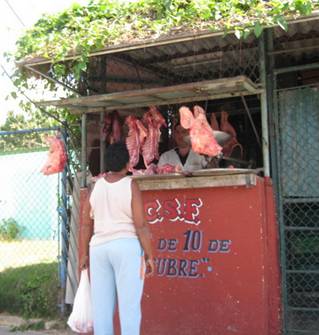 I’m sad to see the streets of the city filled with trash and red earth. The doorways of many of the old mansions and residences in the Vedado neighborhood are converted into improvised stalls which, amid the grime and decay, display all kinds of merchandise from radio batteries to clothes and the worst taste and equal quality.
I’m sad to see the streets of the city filled with trash and red earth. The doorways of many of the old mansions and residences in the Vedado neighborhood are converted into improvised stalls which, amid the grime and decay, display all kinds of merchandise from radio batteries to clothes and the worst taste and equal quality.
Beach umbrellas, nestled in the midst of what was once a driveway, with a makeshift and wobbly table, indicate places where food is sold. You see pedestrians passing by with a decorated cake in their hands, without any kind of protective covering. Others carry, as if it were a briefcase, pigs’ heads grabbed by an ear, or a mattress in a makeshift wheelbarrow dragging on the pavement.
You can see the same images in a country town and in the Havana neighborhoods, Vedado or Neuvo Vedado. The entire city, as our writer Leonardo Padura says, has been ruralized.
But the most painful of all this is to observe the numbers of young people, still school-aged or who should be learning a skilled trade, pushing wheelbarrows uphill loaded with produce. Today I saw with a certain sadness a young man, good-natured, with a face that reflected intelligence and pain,busily pushing his cart up 25th Street, loaded with fresh, clean and well-organized products, having to stop every three or four steps to gather his strength.
That young man probably did not continue studying on perceiving that, in this other way, he could earn more than a badly paid professional. I felt sorry for him and his parents. It is a very unfortunate state of affairs, but the majority of people who have chosen self-employment are the young whose talents are being lost and the country, in the future, will not be able to count on them.
If they weren’t young they wouldn’t have the physical strength to push these heavy carts, which recall those of the colonial era, when the country had not yet been developed and the Cuban nation was being born.
Of what value are those massive calls to study in the universities, after 1959, if the conditions for reversing the fruits of this education in factories, industries, etc. were not created for the development and benefit of the nation. This unfortunately form of commerce in the colonial style is what has proliferated in our battered country, taking us backwards in development.
December 1 2012
Raul Castro’s Racist Grandson / Juan Juan Almeida #Cuba
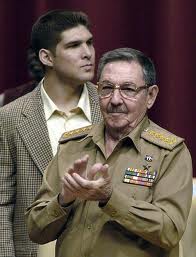 I do not mean to criticize children for being children, nor grandchildren for being grandchildren, I will just talk about a sector that just because we haven’t heard of them, that doesn’t mean they are not full of it. Today I’m answering questions about Raul Guillermo Rodriguez Castro, the son of Deborah Castro Espin and Luis Alberto Rodrigues Lopez Callejas.
I do not mean to criticize children for being children, nor grandchildren for being grandchildren, I will just talk about a sector that just because we haven’t heard of them, that doesn’t mean they are not full of it. Today I’m answering questions about Raul Guillermo Rodriguez Castro, the son of Deborah Castro Espin and Luis Alberto Rodrigues Lopez Callejas.
The marriage of Vilma and Raul was the most iconographic of the Cuban Revolution. He personified the hero, and she her heroic role of compañera, volunteer, submissive and party functionary. Four lovely children were born from the Castro-Espin union, children who in time became spoiled. The first of the grandchildren, the little Rodriguez Castro, was a solitary baby, naughty, lively and stubborn, already demonstrating in his behavior an authoritarian tendency.
Having been born male, with a skilled calculating father, and a sixth finger inherited through his mother, he awoke in grandfather Raul what we might describe as a mixture of love, joy and compassion. Raulito became the favorite. And on more than a few occasions the jubilant El General presented him with a phrase that provoked mockery rather than admiration. “My grandson is a marble beauty, a colossus with a baby face.” The general’s creativity, although it had improved somewhat, continued to be invaded by grandiose and epic concepts.
Surely hoping to construct a paragon of virtues, the family made this little angel a useless mess. So when he was enrolled in “Gustavo and Joaquin Ferrer” primary school, he walked alone accompanied by an inseparable flattery and an unbearable escort that cast a disagreeable spell over boys his age.
Surrounded, or perhaps well-attended by, his scandalous loneliness, he arrived at “Josue Pais” junior high. By then he was already a youngster who liked to annoy people and disliked everyone. Allergic to the entire spectrum of respect, he felt the holy grail of control and enjoyed a certain morbid knowledge that he featured in others’ nightmares.
The eccentricity of the age, plus the constant vision of his family environment, pushed him to drink, smoke, and to choose paths that others older than he called “missteps.” He adopted a vehemently racist attitude that at times managed to embarrass his most loyal friends, family and benefactors.
Out of respect I will not mention the name of the girl who was expelled from the classroom for being black, or rather, because The General’s Grandson announced his decree that he would not share the same space with this classmate because — according to him — blacks are not only ugly and gross, they stink.
By that time, the words “thank you” had been eradicated from his vocabulary. Quite understandably, Cuba suffers a feudal system generous with a dictatorial and anarchy ruling elite; no one has to be grateful for what they believe is rightfully theirs. Nobody learns to say thank you if they are not truly appreciative.
Ungrateful, unmanageable, and at the precise moment when economics is the latest hot topic, Raulito, now the presidential escort, decides to study at the Faculty of Economics at the University of Havana. It is common, and even reasonable, that high performance athletes study for degrees in Sports making international competitions their state exams.
Using this same principle, and after some convincing that included pressure, the rector of the university was left with no options but to understand that the student in question, tall, blond, with a strong build and uncouth manners, should be awarded a degree with honors due to his participation as a special guest at government events. His repeated absences from class were not taken as a sign of intellectual impairment, but as support to the national patrimony.
The winds of change blew, the world map transmuted its colors and this family, by order of their patriarch, needed to be more united. In an act of humility and sacrifice, Uncle Alejandro Castro, known as the Colonel with less body fat than grey matter, paired up with an ex-girlfriend of his nephew Raulito, and so hoisted the flag of the strange family passion for common property.
So, on Sundays, the clan enjoys the exotic delicacies still prepared by old Chute (the cook Jesus); and the rest of the week nephew and uncle review the proper code of conduct for sharing the same woman. It may seem immoral, but it’s nothing new; it is known that Vladimir Ilyich Lenin and his wifeNadezhda Konstantinovna Krupskaya, went with, lived with, and were entertained by Elizabeth D’Herenville (Inessa). Sure, there are differences, the leader of the Bolsheviks, his partner, and their mutual concubine, were not united by consanguinity.
The boss of the State Security Staff of the Ministry of the Interior, and some others under his command, feeling threatened by the real possibility of being cruelly supplanted by a healthy and powerful chip off the old family block, try with incredible care to ridicule him, subtly launching a few phrases into the mouths of public opinion: “Bodyguard 2,” “no one knows if the grandson takes care of the granddad or if the granddad takes care of the grandson,” “I have to look after one and watch the other”… in short, the boy is criticized, but untouchable.
Raulito married, and at the wedding was heard the contagious strains of La Charanga Habanera, an orchestra that, among others, decided to exchange talent for the caresses of power. Later he divorced, leaving a daughter on the way, and making plans for another wedding.
The Castro Espin lineage is like a charitable organization committed to pettiness where common sense is the least common of the senses. Raulito is a victim who didn’t manage to be different. Today he calls himself a patriot and a defender of those ideas that perhaps nobly inspired looting and revolution.
He recreates a sickly ardor to impress the people beneath his social status. He is paranoid, and has only read some of the alternative pages of the life of Julius Caesar; he is really convinced that the end of his grandfather Raul will be reduced to assassination in an act of revenge on the part of his own bodyguard. To say more would be redundant.
December 2 2012
A Necessary “Rescue” / Fernando Damaso #Cuba
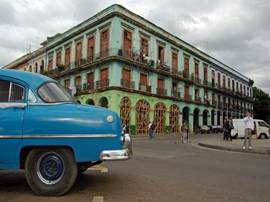
In 1959, “the year of the accident” as a friend of mine likes to call it, there were any number of well-known people who had degrees in business administration and public accounting. They practiced their professions in different manufacturing and service companies and in general their salaries provided them with a good standard of living. Accounting was practiced universally throughout the country, contributing to a healthy economy.
At some point “someone” determined that there was no need for all this, and the system was dismantled. Overnight, business administrators, bookkeepers and accountants either became nothing more than check writers for nationalized companies and agricultural businesses, or had to change professions if they wanted to to survive. In order to cut “the evil” at its root, provincial business schools and university accounting departments were closed. With these measures, economic controls disappeared since “under socialism they, as well as money, were no longer necessary.” Life, however, stubbornly and amply demonstrates what a big mistake this turned out to be. The country paid and continues to pay the consequences, while those who were responsible have never accepted responsibility or answered for their errors.
For some time now there has been a renewed emphasis on the importance of economists and accountants. They even have their own organization—ANEC (National Association of Economists and Accountants). One day, November 26, was inexplicably chosen, however, to be the day on which someone, who knew nothing about economics or accounting much less banking, assumed the presidency of the National Bank of Cuba. After reading about the duties currently assigned to him, while ignoring the gray years as if they had never happened, it seems like there will be a lot of them he will surely find difficult to fulfill. Let’s see. He must contribute to the implementation of the guidelines, design the theoretical foundations of “the model,” develop courses for bookkeepers as well as courses for entrepreneurs, provide advice to strengthen the work of accounting teams and the control of resources, coordinate the preparation of economic reports by directors, and develop a culture of economics, among other things. In other words, try to rescue (one of the verbs most widely used nowadays) all that was lost during the years of improvisation and failure.
It would be beneficial if he were successful, for the good of the nation but also as a palpable demonstration that they never should have done away with these economic activities. Although it is a bit late, it is good to correct things.
December 1 2012
Turbulent Phenomenons / Rosa Maria Rodriguez Torrado #Cuba

How much does a portable radio cost in Cuba?
It is known that during the first days of November the Eastern Cuban provinces suffered from the passing of hurricane Sandy, and that despite its pretty name, it was a destructive meteorological phenomenon that resulted in more than 10 deaths and multimillion material damages.
It will remain in the memory of the eastern province residents as a cyclone that could have crossed those provinces “as a mere meteorological tantrum”, but due to the general poverty of the area, the humiliating and infinitely bad roof tiles — made of cardboard, asphalt, and sand — used as permanent cover, many zinc rooftops and roofs held down “by the goodwill of God”, rusted by the passage of time, in addition to intense rain and floods, created a unique condition that destroyed, due to this Belcebú hurricane, the puny material possessions of many in the region.
We don’t know if most of the damage happened because when they cut electricity due to the high winds nobody coud use a radio receptor to find out the path of the tropical phenomenon, and if those who did have radio receptors, had batteries to make them functional; or perhaps the civil defense did not function with the usual swiftness and order. It caught my attention that the interviews of the local and provincial authorities, conducted during those days, reported that many families evacuated on their own (auto-evacuated?) to houses of families and friends. I don’t know if that was true, if it was guided from the capital, or if it was an easy way out that the local authorities adopted to save fuel. If that was it, where did the saved fuel go?
A few years ago, my mother and I discovered in a neighborhood store a portable radio, no taller than 10 centimeters, selling for 90 CUCs – hard Cuban currency, not the same as the currency used to pay Cuban workers. Some time afterwards, the dollar market was invaded with Chinese radio receptors at $10 which required batteries, solar and rechargeable — the most commonly used one — but they only lasted as long as it took to charge them.
We hope the state believes the people regarding this situation in order to be prepared, individually and collectively, for another phenomenon of this kind, thereby minimizing impact and damages, so that among the hurt and the sarcasm there will be no need to paraphrase the song of the Dominican singer Juan Luis Guerra:hope that radios rain down on the Cuban fields.
Translated by: Marina Villa
November 27 2012
Leonardo Padura: The Man Who Loved Books / Yoani Sanchez #Cuba
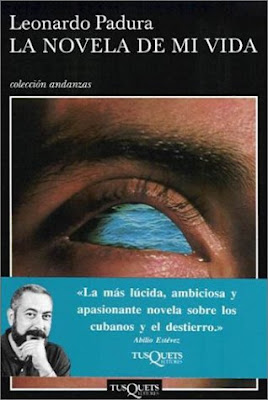 The Mantilla neighborhood exhibits a rare blend of a Havana suburb with a rural village. Its park, its church, its streets that foreign tourists rarely see, and even its famous writer. This last is Leonardo Padura, born in Havana in 1955, a journalist and author of numerous novels. Despite his international recognition and his possession of Spanish nationality, Padura has preferred to live in the same town on the Island where he was born, which has been the scene of so many of his stories.
The Mantilla neighborhood exhibits a rare blend of a Havana suburb with a rural village. Its park, its church, its streets that foreign tourists rarely see, and even its famous writer. This last is Leonardo Padura, born in Havana in 1955, a journalist and author of numerous novels. Despite his international recognition and his possession of Spanish nationality, Padura has preferred to live in the same town on the Island where he was born, which has been the scene of so many of his stories.
The name of this universal Cuban is associated with detective stories, but his work also includes journalism and screenplays. A baseball fanatic, incisive in his opinions and of a proven nobility, on the even of his sixth decade he is an unusual man. His “rarity” lies fundamentally in having been able to sustain a critical vision of his country, an unvarnished description of the national sphere, without sacrificing the ability to be recognized by the official sectors. The praise comes to him from every direction of the polarized ideological spectrum of the Island, which is a true miracle of letters and of words.
Padura commands the force of talent. He has been received with respect, even by those in the Cuban Writers and Artists Union who observe him with resentment for his books that feature the detective Mario Conde. In the hard years of the Special Period his novels took a deep look at a reality that others preferred to whitewash.
His literary honesty, his tenacity, and also a good dose of luck, allowed him to reach th dream cherished by every Cuban writer: to be published in other parts of the world. Publishers ranging from the University of Guadalajara toTusquets in Barcelona, have helped him to position himself as an acclaimed novelist. This international recognition has also prevented the local censorship from simply making him invisible, and instead they try to accept him, although reluctantly.
The “writer of Mantilla,” as many call him, has the rare privilege of seeing his novels photocopied and circulated as pirated editions among his compatriots. This insatiable appetite for his pages is also due to the small runs the local presses have made of his most popular titles. If we were to measure the success of an author by the number of times someone makes an illegal copy of his work, then Padura would earn the highest score of any living Cuban.
If 2011 was a year full of accolades for the author of Past Perfect (Tusquets, 1991) and The Novel of my Life (Tusquets, 2002), it now ends confirming Padura as the great Cuban novelist of today. In 2012 he has continued to build on the favorable track record left by his book The Man Who Loved Dogs (Tusquets 2009), which deals with the life of Ramon Mercader, Leon Trotsky’s murderer. In November, he was also celebratd with an Author’s Week in which Havana’s Casa de las Americas presented a collection of his stories and essays under the title A Man and an Island.
Currently working on the book Heretics, which he has defined as “three novels which have a tenuous and invisible thread.” The movie 7 Days in Havana (French-Spanish co-production, 2012), which he collaborated by writing the script from one of his stories, has given us a lot to talk about by showing a city if interwoven hardness and sensuality.
Leonardo Padura is now the face of Cuban literature inside the island and we are tremendously lucky that this is so.
1 December 2012
Bloggers and Twitterers at Paya / Mario Barroso #Cuba
In addition to the traditional groups and opposition personalities was very emotional for me at Paya’s funerals to interact with new trends in the opposition which are the bloggers and twitterers who are independent, non-partisan and who are not directed by others, whom I met spontaneously while paying honors to Paya.
I will never forget the gesture Yoani Sanchez herself on meeting me that strange night in the parish, as she did with many other pilgrims, motioning me to come the nearby park where there was an active group of collaborators who offered me water, coffee and a T-shirt with an excellent picture Payá in which the Cuban flag was also illustrated next to a picture of Varela, which I keep as a relic and still hope to wear at relevant times to come.
From that moment I was part of a large group of participants wearing the garment which became one of the most eloquent tributes paid during those historic hours of tribute to he who was the coordinator of the Christian Liberation Movement.
Our army of technologists with a vocation of humanity narrated tweet by tweet every scene of this historic farewell that cost Cuba one of its best sons. And it was not only those of us who were present, the privileged who could get there. Countless colleagues worldwide constantly called up and helped to recharge our mobile phones, without which we would not have been able to send so many tweets into cyberspace.
Some of us “opened” our cellphones so distant friends could hear live such important moments as the mass officiated by the cardinal in the morning before the burial, and even the radio stations took advantage of our contruibution to broadcast it live, no matter the quality or the interference, because the information was must more valuable than any problem with the effectiveness of the transmissions or the channels.
Following the instantaneous character of Twitter, surviving the still not exhausted posts of many who were present, or of those who followed in from a distance, whatever could be done, all the issues relating to this man who shines so brightly in his absence as he shone in his presence.
November 6 2012
Members of the internal Cuban Resistance reaffirm their pledge to keep up the fight for democratic change in the streets of Cuba / Jorge Luis García Pérez Antunez
Today is the 27th of November 2012 and after having sung the notes of the National Hymn a group of Cuban resistance members, militants from different organizations of the peaceful opposition, are here in the city of Placetas on the roof top of the home headquarters and we are and are going to give a reading in the voice of Sara Marta Fonseca Quevedo of a joint statement of various organizations about themes of the Cuban resistance.
Statement:
Many opposition organizations gathered in the city of Placetas this November 27, 2012, in order to draft and make known this joint statement in which they express their commitment and collaboration, as well as their reciprocal loyalty in moments in which the regime through its political police becomes embroiled in a dirty and pre-meditated campaign to bleed the vital forces of the Cuban resistance, specifically those who have contributed most to that important breach and earnedareas of freedom.
The Cuban Party for Human Rights affiliated with the Andrei Sakharov Foundation, the Rosa Parks Women’s Movement for Civil Rights, the House of the Prisoner Ernesto Diaz Madruga, the Mario Manuel de la Pena Movement for Human Rights, the Cuban Association of Free Yorubas, the Pedro Luis Boitel National Civil Resistance Movement, want to let emerge in an open and responsible way our resolute decision to respond with unity, commitment and activism to the despicable effort to remove the internal resistance from the streets and public spaces in order to return them to their homes and enclosed places.
Those present here, all promoters of civil disobedience as a fighting strategy, want to make quite clear our unconditional support for any civilian project that may be put into practice, emphasizing our priorityof those initiatives thatfurther international repercussion and other media impacts that may promote change, from the citizen, from the actual phases and taking into account the potential factors for democratic change.
Signed:
Damaris Moya Portieles, Central Opposition Coalition
Yaite Dianeyes Cruz Sosa, Rosa Parks Movement for Civil Rights and Central Opposition Coalition
Orestes Eusebio Hernandez Guevara, Cuban Free Yorubas Association and Central Opposition Coalition
Blas Augusto Fortin Martinez, Mario Manuel de la Pena Movement and Central Opposition Coalition
Yris Tamara Perez Aguilera, Rosa Parks Women’s Movement for Civil Rights and Central Opposition Coalition
Arturo Conde Zamora, Pedro Luis Boitel Civil National Resistance Movement and Central Opposition Coalition
Jorge Luis Garcia Perez Antunez, Orlando Zapata Civil Resistance and Disobedience Front
Also added to this statement:
Jorge Vazquez Chaviano, Cuban Party for Human Rights affiliated with the Andrei Sajarov Foundation and the Central Opposition Coalition
Segundo Rey Cabrera Gonzalez, Cuban Committee for Human Rights and the Central Opposition Coalition
From the Youth Movement for Democracy and the Juan Pablo II Movement for Human Rights:
Roberto Gonzalez Pelegrin
Rodai Matos Matos
Yunier Jimemez de la Cruz
Francisco Luis Manzanet Ortiz
Jorge Leiva Serrat
Jesus Pena Ramirez
Luis Noa Silva
Emilio Almaguer de la Cruz
Reinier Reina Salas
Randy Caballero Suarez
Rolando Rodriguez Lobaina, National Coordinator for the Eastern Democratic Alliance
Donaida Perez Paseiro, Rosa Parks Women’s Movement for Civl Rights and the Central Opposition Coalition
Loreto Hernandez Garcia, Cuban Free Yorubas Association and the Central Opposition Coalition
Luis Enrique Santos Caballero, Central Opposition Coalition
Jose Lino Ascencio Lopez Central Opposition Coalition
Barbara Moya Portieles Central Opposition Coalition
Juana Contreras Aguilar Central Opposition Coalition
Yanoisis Contreras Aguilar Central Opposition Coalition
Xiomara Martinez Jimenez, Rosa Parks Women’s Movement for Civil Rights and the Central Opposition Coalition
Sara Marta Fonseca Quevedo, Cuban Party for Human Rights affiliated with the Andrei Sakharov Foundation
Long live the internal resistance! Viva!
Long live the Cuban Party for Human Rights affiliated with the Andrei Sakharov Foundation! Viva!
Long live the Pedro Luis Boite National Civil Resistance Movement! Viva!
Long live the Rosa ParksWomen’s Movement for Civil Rights! Viva!
Long live the Front! Viva!
Long live free Cuba! Viva!
The streets are of the people!
We are all Resistance!
Attention, attention, we are informing you that before undertaking this activity military troops armed with bladed weapons have just entered thechildren’s circlelocated next to my home, the Golden Age, there is stupor, there is fear, there are several relatives that have approached this circle to take their children and we are blaming the communist Castro tyranny in the person of Raul Jazares, chief of the political police for the psychological damage that the sight of those firearms may cause to those little children.
Jorge Luis Garcia Perez Antunez, Orlando Zapata Civil Resistance and Disobedience Front
We want to highlight that we dedicatedtoday’s celebration to the honor of the eight medical students who one day like today werekilled by the cowardly bullets of the Spanish colonialists.
Jorge Luis Garcia Perez Antunez, Orlando Zapate Civil Resistance and Disobedience Front
Translated by mlk
November 27 2012

